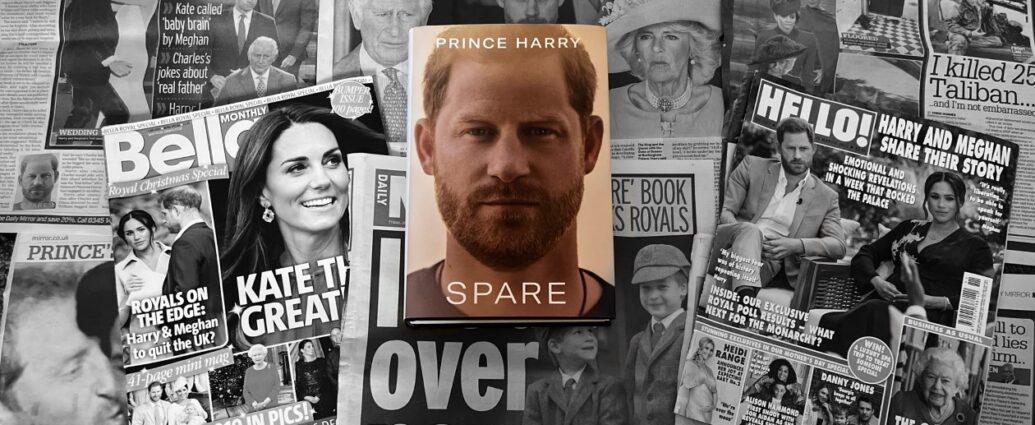Katie Nelmes
The much anticipated memoir, Spare by Prince Harry the Duke of Sussex, became the fastest selling non-fiction book in the UK since records began. The title refers to the royal tradition of having an heir to the throne, and a ‘spare.’
The core themes of the book are the press and mental health. The media treatment of Harry is linked to his status as a spare because he provided distractions so members of the family look good in comparison. Harry explains that the book is his attempt to explain to his family, and the world, why he felt he had to leave his royal duties.
Part 1 – Out of the Night That Covers Me
There are three core sections of the book. The first focuses on his childhood: most famously the loss of his mother Diana in 1997 when he was 12. We learn about the trauma this caused a young Prince Harry. He was unable to cry for years after his mother’s death, despite his public outpour of grief. Unable to cope with the loss, Harry theorised that his mother had simply ‘disappeared’ and would one day come back for him and his brother.
“he realises this was the first in many stories to come”
The press began to impact Harry throughout his school days. He writes about the first instance where he was singled out by the press after he broke his thumb in a rugby match. Looking back, he realises this was the first of many stories to come.
Part 2 – Bloody, Buy Unbowed
“it seemed he had traded in one kind of conflict zone for another”
Secondly, we turn to Harry’s time in the military. We learn how the military was important for him mentally, to be anonymised and known only as ‘Window Six Seven’. Years of experience in the army brought Harry peace from the eyes of the press. It seemed he had traded in one kind of conflict zone for another one. One that he felt more in control of, despite its dangers.
The military gave Harry a purpose and allowed him to demonstrate his talents such as flying helicopters and demonstrating great leadership and teamwork skills. Despite Harry’s sense of patriotism, there has been much controversy from the book as he stated he killed 25 people in Afghanistan. He justifies this by stating that the kills were deemed ‘justified’ by his team, but that the number gave him no satisfaction.
Despite the controversy, Harry’s military experience prompted him to later create the Invictus Games. He describes the wounded soldiers he saw during his time in the Army, and how he realised he was also suffering from post-traumatic stress and panic attacks. Sport, he realised, provided a positive outlet for the wounded soldiers, and the Invictus Games could be used to amplify their stories and raise awareness.
Part 3 – Captain of my Soul
“I hadn’t been ready for the racism”
After reading about Harry’s previous relationships, the final chapter details when Harry met Meghan, describing their first dates and long-distance relationship. After months of hiding their relationship from the public, the press soon turned to creating infamous, often racially motivated, attacks on the couple. He admits in his memoir: “I hadn’t been ready for the racism. Both dog-whistle racism and the glaring, vulgar, in-you-face racism.”
This chapter details Harry’s attempts to defend Meghan from the press, and the lawsuits they launched against the media. All this, Harry claims, was without the support of his family and the institution. These experiences prompted Harry to go to therapy where he was told he was ‘undeniably addicted’ to reading the news.
It has often been said by supporters of Harry and Meghan that their decision to leave royal life was an example of them breaking generational curses. Harry seems to have become aware of this, as he describes how the experiences with the press and his journey with therapy made it difficult to relate to his family.
Final Thoughts
This is definitely a book I would recommend reading, regardless of your opinions on Prince Harry and his decisions. I think the three sections of the book appeal to various interests about Prince Harry’s life – his upbringing, his military career, and the most recent years of his life with Meghan Markle.
What Harry seems to want readers to take away from the book is a true understanding of the toxicity of the media, the complicity of the royal institution, and what needs to change.
Although the book has already sparked controversy, I think the main message Harry wants readers to take away can be summarised by the following quote:
“My problem has never been with the monarchy, or the concept of the monarchy. It’s been with the press and the sick relationship that’s evolved between it and the Palace. I love my Mother Country, and I love my family, and I always will. I just wish, at the second-darkest moment of my life, they’d both been there for me.”
Featured image courtesy of Katie Nelmes.

